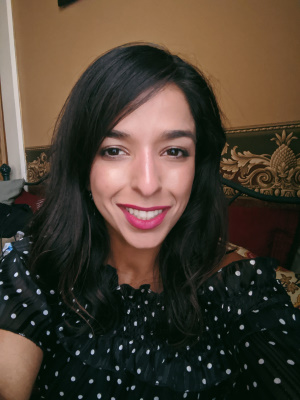Fellowship Fuels Ph.D. Student Nika Nour’s Study of Deepfakes
 This summer, informatics Ph.D. student Nika Nour was awarded $4,000 after receiving the Joseph and Dorothy Fischer Memorial Endowed Fellowship. Directors of the Trilog Corp. established the fellowship in 1982 in honor of their founder, Joseph Fischer. The first-generation American was a self-made man who embodied the spirit of entrepreneurship, and his wife, Dorothy, was a lifelong educator whose values of commitment, hard work and determination were an example to all she knew. The Fischers valued mentorship to further the education of young people and to help others, and Nour was more than grateful for the assistance.
This summer, informatics Ph.D. student Nika Nour was awarded $4,000 after receiving the Joseph and Dorothy Fischer Memorial Endowed Fellowship. Directors of the Trilog Corp. established the fellowship in 1982 in honor of their founder, Joseph Fischer. The first-generation American was a self-made man who embodied the spirit of entrepreneurship, and his wife, Dorothy, was a lifelong educator whose values of commitment, hard work and determination were an example to all she knew. The Fischers valued mentorship to further the education of young people and to help others, and Nour was more than grateful for the assistance.
“After months of dealing with COVID-19 related hardships, I was thrilled to learn that I received this fellowship,” says Nour, who joined the Donald Bren School of Information and Computer Sciences (ICS) last year to earn her doctoral degree. “Being a recipient of this ICS fellowship brought some hope back into my studies and helped fuel my ambitions during the summer.”
The Influence of Misinformation
The focus of Nour’s studies is misinformation — in particular, deepfakes. “After seeing the devastating consequences of misinformation and having suffered from them myself, I became passionate about discovering what causes people to be susceptible,” says Nour. “If someone like myself, who has spent over a decade working on technology policy standards, [who has] designed game development curriculums, and has coding experience, can be susceptible to false information online, then who else is falling for deepfakes?”
As executive director for the International Game Developers Association (IGDA) Foundation and CSO of Liminal Esports, Nour is no stranger to technology, so she decided to focus in on how deepfakes can influence a person’s values, beliefs and biases. “I am specifically interested in the end user’s ability to trust or reason with more complex video visuals and long-term effects on personal beliefs,” she says. “This work requires taking a sociological and cognitive approach, not just a technological one.”
Furthermore, she points out that although deepfakes present threats to privacy, national security and data infrastructure, there is currently a lack of related legislation and regulations. “There are limited corporate policies, federal and state laws, and repercussions for weaponizing online content, distributing misinformation, and using identities without consent,” she says. “This unique study will help reveal when falsity is achieved, what reputational and cognitive harm is done?” She further argues that “deepfakes can invoke not just personal harm but societal harm, threatening the foundations of trust and society.”
Developing Solutions
Nour’s long-term goal is to work with internet platforms and to develop policies, techniques and legal frameworks to better address the spread of misinformation. “Through my graduate studies, I aim to build a foundation of domain knowledge on misinformation online and become an expert in designing quantitative experiments,” she says. “After my doctoral studies, I plan to scale my experiment and research other visual mediums of fake content [and] to bridge this research with social networking companies, test possible solutions, and draft consumer standards on content moderation.”
More information on the Fischer family and past fellowship recipients is available online.
— Shani Murray